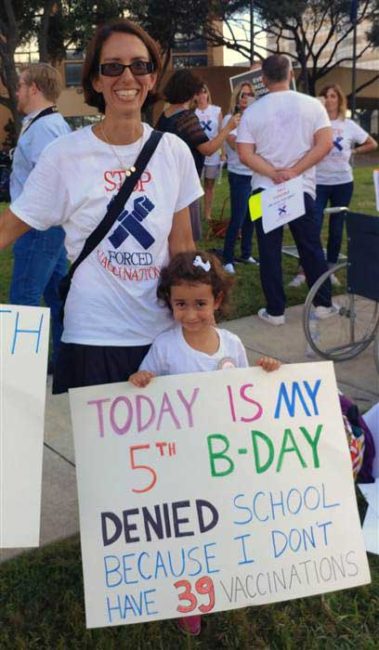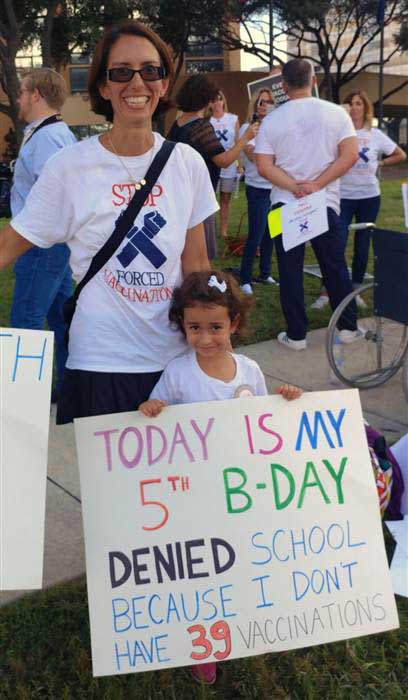 Meet Dene Shulze-Alva and her daughter Sage, age 5. The above is a picture of her that was highlighted within an NPR article about vaccine denial.
Meet Dene Shulze-Alva and her daughter Sage, age 5. The above is a picture of her that was highlighted within an NPR article about vaccine denial.
The backstory here is that she is a hardcore vaccine denialist who has not only refused to have her daughter vaccinated, but takes time out to fly right across the US to go and protest about vaccine legislation in another state. Her belief has come with a cost. Because of her stance she will be soon unable to enrol her daughter in any school due to a new law in California that bans children who have not been vaccinated from attending. The picture above was taken in Houston where Dene had travelled from her home in Los Angeles to take part in a protest.
NPR interviewed her …
“Look at her. She’s 5. She’s maybe 28 pounds. I can’t inject her with the dose they are requiring,” says Shulze-Alva, a chiropractor.
None of her children are fully vaccinated, says Shulze-Alve, who smiles pleasantly and patiently lays out her arguments. And now California has eliminated personal belief and religious exemptions for vaccination, meaning children may not enroll in school if they are unvaccinated unless they have a valid medical reason.
The state tightened restrictions after a measles outbreak in 2014-15 sickened 131 people in the state and 147 nationally. State health officials said the virus was imported by a traveler, but took hold and spread among pockets of people who had unvaccinated or undervaccinated children.
“We are forced into home schooling. Sage cannot enroll in any school,” says Shulze-Alva.
The personal liberty card is the stance being taken. Well yes, I don’t want to drive on the right-hand side of the highway, I want to drive on the left, and so the state insisting that I am both licensed and also insisting that I must drive on the right is a personal liberty issue … right?
Yes, it is that crazy.
If you are reading this then it is highly probable that you are familiar with the arguments presented by the anti-vaccine believers, and are also aware that the various anti-vaccine claims they promote have no scientific basis at all. The reality of where things actually stand is that vaccines are generally recognised as one of the most successful public health interventions ever undertaken by humanity. Quite horrendous and deadly things such as smallpox and polio have been successfully eradicated. Despite this fact, the anti-vaccine stance is one where vaccines that protect against all of this are supposedly poisoning children.
People tell each other stories such as this …
Paula Bryant of Oregon said her 17-year old daughter is profoundly disabled with autism and she blames vaccines given to the child at 18 months.
“I can’t say what caused it. I can only say that three days later she could barely function,” she said.
Bryant took her daughter to a practitioner who told her the girl’s blood was full of heavy metals such as lead, arsenic, antimony and mercury. “I wondered how she got it,” she added. “The government and the people who made these vaccines know there is a dark side.”
The problem is that none of this is actually true or factual, and yet in the internet age such stories rapidly spread as “truth”. Absurd claims abound and yet when presented with clear evidence, there is a blunt refusal to accept it …
“This is a runaway train,” says Tammy Johns, a life coach with three daughters who lives in the Bay Area of San Francisco. She blames her daughter’s ear infections, bronchitis, asthma and diarrhea on vaccines and rejects arguments that failure to vaccinate children puts other kids at risk.
“My first doctor bullied me,” says Johns. “He kept leading me to the (American Academy of Pediatrics) website. He said he wouldn’t see me when we refused vaccines. We just get shut down.”
These are people who are quite convinced that the Centers for Disease Control and Prevention, the National Institutes of Health, American Academy of Family Physicians, the National Foundation for Infectious Diseases and the World Health Organization, are all incompetent buffoons or are are part of a grand conspiracy, hence any medical evidence offered from such sources will be rejected.
So how do you respond to this?
The rather obvious and ever so human response is perhaps along the following lines …
- These people are stupid
- These people are missing a bit of information and if we give it to them, they it will all be sorted out
The problem is that neither of these observations is actually true at all.
Let’s take a quick look at each in turn.
Stupidity Incarnate
If you attack values that people embrace, and this is especially true of values that people embrace at an emotional level, then they will immediately raise their shields, dig in and become very defensive. Think of any and every “discussion” you have taken part in on Facebook and ponder over how well they usually pan out.
Let’s flip the coin over. If somebody gets in your face and starts yelling that you are an idiot, a complete moron, would your immediate reaction be one where you would respond with “well gosh, you are indeed correct” even if you had actually done something daft?
This strategy really is not a viable means of persuasion.
So why is it like this?
We tend to filter information, and so things that conflict with beliefs get rejected as fake or invalid, and things that confirm a belief will be accepted. We all tend to do this to one degree or another there is no special subgroup here. The term used to describe this is confirmation bias.
In other words we tend to be very prone to believing what we want to believe. The way our brain operates means that we will often filter out things that conflict with rationalisations that appears to be very reasonable.
Immunised Against facts
Hard solid facts are not things we use to make decisions. We are not principally driven by the best available information, but instead we make decisions for other reasons. We are a walking cauldron of fears, hopes, dreams, and already existing beliefs. With a click of a button we can find “evidence” that will support almost anything. Flat earth? Not a problem. How about the belief that the Universe is just a simulation? Also not a challenge.
We are driven by our deep need to belong, to be part of a tribe, to fit in, to be right, to gain control over chaotic events.
So how can we engage in a manner that potentially works?
If you issue dire warnings and deploy a verbal stick by telling people that they are being idiots, it really will not inspire anything except perhaps an entrenchment within a previously held stance.
If however you engage at a level that taps into human psychology, then you can actually create an opportunity for hope and self-improvement to nudge a change.
In the end there perhaps also needs to be a realisation that some will never be persuaded. Cutting them off from all medical access is perhaps not the best course, they are left with just the quacks and others peddling highly dubious stuff to turn to. If however people opt to not vaccinate their kids then there also is now a rising consequence in some states – no access to expose other kids to the excessive risk.
Bottom line: Don’t berate, talk down, or even demean the choice being made. Instead inspire, and encourage by selling the benefits of participation in the one of the most successful public health interventions ever undertaken by humanity.
Sound bytes
Many parents and even pediatricians are not old enough to remember when measles was common and killed up to 500 people every year, mostly through complications such as pneumonia and encephalitis.
“This has always been an issue of risk versus benefit. Why should they take the small risk of the vaccine if the disease isn’t around?”
…
“People in the opposition say they want children to get these diseases naturally,” Pan said. “But children die of these diseases. They become paralyzed. They develop brain damage. This is not something I would wish on anybody’s child.”
…
“Our findings suggest that measles vaccines have benefits that extend beyond just protecting against measles itself,” said Michael Mina, a medical student at Emory University who worked on the study while doing postdoctoral research at Princeton University.
“It is one of the most cost-effective interventions for global health.”
“If you get measles, three years down the road, you could die from something that you would not die from had you not been infected with measles.”

